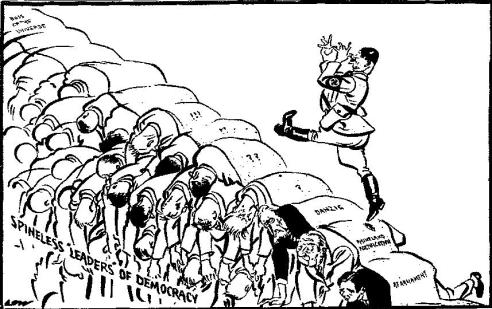
Wednesday, April 15, 2009
Dinesh D'Souza... Religion

Being Normal

This cartoon depicts the one-sided view that these leaders or groups have. I found it very interesting because it says “normal” people. Like many of us have argued, normal does not have an exact definition. Nobody is normal. And if there is such a thing as normal, the boundaries are, for sure, not clearly defined. These leaders took advantage of that and molded the boundaries to fit their standards. In each of these cases the normal was not being a Jew, black, guy or some other group these leaders decided to team up against. Besides taking advantage of the lack of boundaries of the word normal, they also took advantage of the population's want to be normal. The majority of the people want to be normal and fit in. Many of them would do anything to fit in and the leaders knew they would most likely not retaliate because of this. Overall, I like this cartoon because it clearly demonstrates the power these people used to manipulate the simple definition of the word “normal,” into an excuse for their unforgivable actions. It doesn't only display how they were able to manipulate, but how the people were able to be manipulated. This picture reminds of what people would do because of a simple desire to be "normal."
Tuesday, April 14, 2009
Holocaust: Lots and lots of bad yet some good
Monday, April 13, 2009
17 year old girl flogged by Taliban
While reading the New York Times, I discovered a shocking article regarding the Taliban, “Video of Taliban Flogging Girl draws Widespread Outrage.” Reading further into the article, I noted that the 17 year old girl denied the request to marry a Taliban commander and was publicly flogged as a result of her actions. In our history class we recently discussed the Taliban and in particular its control of the Swat Valley in Pakistan. This event took place in Swat Valley - which is the region Pakistan gave to the Taliban.
In other articles we have read about concerning the Taliban, women have no rights. Even with that knowledge this article still comes across as a shock. Someone watching the event was filming with their video recorder on their cell-phone, while the young girl yells phrases such as, “For God’s sake, please stop, stop it, I am dying.” It doesn’t specify who put the video on the Internet, I imagine (and hope) it was someone who was trying to show the world what the Taliban is really about and this video is just one plea of help.
"The Lines a German Won't Cross"

Socialism, Capitalism, and Modern Propaganda
The article also states that in an earlier survey 70% of the American people said they preferred a free market economy. While a free market and capitalism are not exactly the same thing, they do tend go hand in hand. Though this poll was taken earlier, it was not much earlier. So this difference is most likely due to the ideas associated with the words and the propaganda behind them. The words "free market economy" appeal to our belief in the freedom to choose, while capitalism tends to be seen as the rich getting richer while everyone else struggles.
These discrepancies show that many people don't understand what we consider basic economic policies. Maybe the problem is that these "basic" policies are not so basic anymore. Terms like socialism and capitalism and even communism have been used in so many different ways to describe so many different policies that they have lost any meaning they originally had. They have simply become modern propaganda. Perhaps new universal definitions or completely new words are needed.
This article provides an interesting opinion of this topic and includes the opinions of many other people as well. So if you are interested in learning more click here.
"If You Give a Mouse a Cookie"
